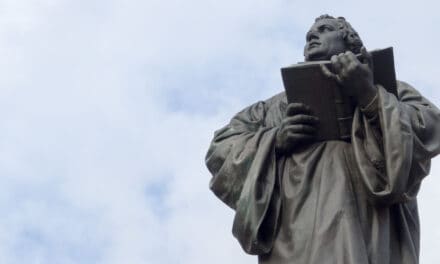A Short History
As a phenomenon in church history, Deism was a movement particularly of the late seventeenth through the eighteenth century. It was a movement that taught a creator god who made the world to run according to laws and endowed man with certain moral values. After having done that, god was no longer active in the affairs of the world. In effect he became the distant god: there to explain the existence of the world, but not involved in its functioning.
There were clear consequences. Since this god could not come into the world in the person of the Son of God, the Messiah, Jesus had to be no more than a man. The Holy Spirit could not act to bring men to new birth. The Scriptures could not be inspired by the Holy Spirit but had to be a purely human product. Blessing or calamity had to be the result of the operation of impersonal forces rather than the providence of a personal God. If God was not active in the world, aside from a very distant creative activity, the organized, complex world we experience had to come about by evolutionary development.
It its time period, there were certain factors which facilitated the growth and ascendency of Deism. The classes, which came to prosperity in early modern Europe and America, with the growth of trade and the beginnings of the industrial revolution, did not welcome the supervision of a real God nor the existence of an active church that would rebuke them for sins. Further, when things go well for men in this world, they are inclined to think that they do not need God. In England the ejection of the Puritans in 1662 from the Church of England, and the measures to suppress the Non-Conformists, removed or inhibited those who preached the biblical religion. In Scotland the removal of congregational right to call ministers and the giving of the right to the local nobility made it less likely that evangelical ministers would be given opportunity. In France, where the Deists were more the patrons of revolution, the corruption of the Catholic Church and its ties to the monarchy produced a very anti-clerical Deism.
The apparent success of the new physics and its application in technology made the Deist view of the world, as a world that worked by laws without divine intervention, plausible. Strenuous efforts were made to extend that vision of the world as an order, which did not need divine activity. The economic theories and moral philosophy of men, such as Adam Smith and Adam Ferguson in Scotland, were part of the attempt to see human society as operating without the need of God or his moral law.
Finally one must mention the wars that swept across Europe between Protestant and Catholic armies or between royalists and parliamentarians in the British Isles. Wars of religion produced a fear of religious extremism. “Enthusiasm” became an ecclesiastical swear word in Scotland, as a way of scorning biblical religion.
Not Again?
Given the specific historical circumstances under which Deism flourished, it is unlikely that we will see a simple repeat. That is not what I am suggesting. Rather I suggest that one can see a tendency for emphases, which belonged within Deism, to reappear even within Evangelicalism. Certainly what is often called theological or ecclesiastical Liberalism tends to be Deism under another name. While Liberals may not be so blatant in denying the deity of Christ, though some are, the key doctrine of the distant uninvolved god is there. That is why Liberals can so quickly proclaim, whenever a natural disaster strikes, that God had no part in it. Their god is literally out of this world. Hence also, they advocate things, which are an abomination to God, such as homosexuality, confident that there is no God that will intervene and judge them.
However they are not my main concern, which is rather Deist-like tendencies where one should not expect them. The primary piece of evidence, which I will bring forward for my thesis, is the way in which producing Christians is seen in terms of human organization and strategy. If one goes back to an earlier influence of Deist thinking, the missiology of Finney, one sees there an open avowal of the belief that, in this law-ordered world, men can be brought to Christ by an understanding of the regularities of religious phenomena. Today people do not speak the jargon of Finney but act as though his beliefs were sound. There are certain techniques which if followed will certainly yield an increase in Christians. The confidence is not the same as Finney’s, because the methods do not always live up to their promise and new ones must be sought. However the very search for the method or technique to be applied speaks of the lack of need of divine intervention. I grant that there is a major difference in that Deism grew out of the success of physical laws as explanations of the natural world. More recent approaches are adopting what is seen as being successful in the business world. Nevertheless I contend that there is something in common: the confidence that the right method will yield results.
Often the confidence, with which this method or that method is advocated, is buttressed by the claim that God’s mercy and love through Christ is so certain that anyone who doubts the certainty of success in doubting the love of God. That places sceptics in a difficult situation. Yet note that it excludes divine wrath and the rejection of people because of their unwillingness to believe. Matthew’s gospel (13:58) records that Christ did not do many works of power in his hometown because of their unbelief. If Christ refrained from blessing and if Acts (13:46) records Paul and Barnabas turning from one group to another because of rejection of the gospel, who are we to say that there can be no such rejection in our day? Actually this attitude, that ignores any possibility of rejection by God, is already verging on treating God as an impersonal force. The biblical God is personal and fits his actions to the situation.
Along with this change has gone a change in preaching: away from that biblical exposition that seeks to place the listener before God and towards a display of what the church or certain church endorsed therapies can do for the life and family of the hearer. If the crucial problems the church addresses are to problems we face with other people or the situations of life, is it ant wonder hat God seems less relevant?
A second evidence of the drift towards positions that fit a belief in a distant god, appears in tendencies in biblical studies. There is an increasing tendency to depict biblical authors as people of their own time, whose views were limited by the ideas, knowledge and situation of their times. There is a world of difference between the Holy Spirit inspiring men to present truth, valid for all time, in the language of the author’s time and an author expressing the ideas, now largely superseded, of his own time. Often that crucial difference is blurred in the treatments, but the second possibility is clearly hinted.
A further symptom is a shift towards social action being, not an accompaniment to or consequence of the gospel, but a substitute for it. Once again the shift will be subtle and sometimes one of emphasis, because there is still some awareness of how Liberalism completely replaced the gospel with social programs. Nevertheless, the trends are discernable.
The paradox is that many who act and speak this way will espouse an orthodox doctrine of the deity of Christ and the necessity of the work of the Holy Spirit to bring about regeneration. Praise God that they have evangelical rather than Deist doctrine. Yet when evangelical doctrine mixes with a methodology that seems to have different foundations, we are justified in asking what has happened. My suspicion is that certain factors, some of which have parallels with the influences behind Deism, have produced a tendency for God to be distant in the thought and experience of those who are drifting this way.
I suspect that a crucial factor is peace and affluence. When you are hiding from the police because you are a believer and/or you are struggling to feed your family, you do not need a distant, unengaged, god. You need the biblical God, who acts for those who fear him. It is easy in our society to fall into thinking that things will go well for us, whether God acts or not. In addition we must confess that our sinful natures would prefer a Deist god. Then we could indulge our corrupt natures without fear of punishment or chastisement.
A further factor is the influence of a belief in theistic evolution. If God merely supervised a natural process which took billions of years, and even produced man that way, then the natural process is the immediate reality. God may be there but he is a more distant reality. Please be clear that I do not accuse all theistic evolutionists with having a distant God. We Christians are blessedly inconsistent; we will hold ideas, which should threaten our faith, but God by his Spirit still holds us in his hand. Rather I am saying that the tendency of theistic evolution is to make God appear more distant and uninvolved.
If currents of thought and experience, such as affluence and theistic evolution, tend to make God less immediate to us, what keeps in our minds the consciousness that God is real, present and active? I suggest that it tends to be our private devotional life. Am I moving in the wrong circles, or do I notice a subtle shift there? When I first became a Christian, having a morning Quiet Time was a commandment, which seemed to rank above the Ten Commandments, I do not hear that now. In one way I am not sorry; the morning Quiet Time tended to become a form of evangelical legalism, possible for single students but very difficult for families with young children, long commutes to work and so on. That is not to say it was bad in itself. I am sure many can testify to the blessing and strengthening they obtained from that discipline and which they may still enjoy. The problem is rather that, like any human rule, it is not always practical. If as I suspect, the Quiet Time is loosing emphasis for understandable human reasons, is anything replacing it? I suspect that better than the rule of the morning Quiet Time would have been an emphasis on the duty of each Christian, in whatever mode suited his calling and his circumstances, to pray, read and meditate. However that is possibly a past opportunity. The more crucial point is whether loss of personal devotion time is making God less real and present to us.
Let us not take out of the picture the role of the state, or what often doubles as the mouth of the state, the popular media. Anybody with half a brain should know that to call Muslim terrorists “Fundamentalists” is a display of ignorance. Radical Islam depends more on tradition than on the Quran. One could more accurately call them Jesuits or Catholics. Yet the branding as Fundamentalists is part of a deliberate attempt to lump together any sincere religion as dangerous fanaticism. Note here the parallel to the Deist scorn of “enthusiasm”. Let us not forget that we live in a society where blatantly wrong practices are legislated for, and criticism and opposition to those practices are inhibited. Even those who do not so engage have adopted a hedonism and a materialism that equally requires a distant god, or none at all. Though, in the history of ideas and science, evolution was a logical consequence of belief in a distant god, now the relationship is perceived as the reverse. It is the “truth” of evolution, which prevents God being real and active. Hence any government which exists for the peace and comfort of it supporters – as all governments, which depend upon happy voters, do – will seek to ensure that “fanaticism” is suppressed and that evolution reigns supreme. If you doubt my claim ask why over a billion dollars was spent to send a rover to Mars, hopefully to prove that life once existed there. As governments and media support such directions, the church comes under pressure. Belief in a more distant, less involved god, is an easy way out of the pressure.
I suggest a final very subtle factor. I encounter people who ascribe their lack of passion in the things of God to a desire to avoid the extremes of the charismatic movement. Certainly some of the stupid excesses of that movement have helped nobody. Yet is that the sole reason for a lack of passion? We come out of European cultures deeply influenced by the study of Classical antiquity and the pagan virtue of Stoicism: stiff upper lip and all that. Those virtues were particularly inculcated in the gentile and urbane classes. Indeed they were often seen as one of the distinctions between the upper classes and the great unwashed. Evangelical Christianity is in danger of becoming restricted to the upper middle class. With such class focus comes the danger of unconsciously accepting the modes and mores of the class. Is the lack of passion an avoidance of charismatic excess or a characteristic of our social captivity? Whatever the cause, I think a distant unengaged god more naturally goes with an unengaged, passionless Christianity.
It is fine to diagnose a problem; dealing with it is another matter. It would be totally illogical for me to describe the belief in a distant god, which makes people think they have to do everything, and then to lay down a seven point human plan as a solution. When men lose the presence of God, they cannot bring him back. It is our sins that alienate him. Whether, in any particular instance, it is his grace that moves us to repent and seek him or our repentance that moves him to mercy, is a nice theological point, but irrelevant in desperate circumstances. We must begin by praying for mercy. Those who think God is distant and hence they must do all the organizing and energizing work, will scorn us as a holy huddle. No matter. The presence of God is worth more than many criticisms.
Such prayer will not come from us, unless we are convinced of our own sin-induced weakness and unworthiness. If God is not present and acting in power, then he has withdrawn his blessing, because of our sin. It is all very well to criticise those who do not see the power of God as a present reality, but to what extent is our own unbelief and sin a cause of the lack of the exercise of the power of God? Theological correctness can be conducive to human pride, rather than to the sort of repentance that God requires.
Earlier I wrote of the glib assurance that God will bless our efforts and the latest evangelistic methodology. I warned of the danger of ignoring the wrath of God. Yet we do not question the plan of God to redeem men. What we really question is whether by making God more remote – less one with whom we have to do moment by moment – the church is rather obscuring the thrust of the gospel. It is to the poor and humble that the gospel is offered. Look at the gospel examples, the praying tax-collector (Luke 18:9-14), and the Canaanite woman, content to be called a dog as long as some crumbs of mercy could come to her (Mat. 15:21-28). A distant God does not induce the reverence by which men see themselves as they really are. Confidence in human ability and methods inhibits real repentance.
In short how can we induce men to see themselves as sinners, and so turn to the grace of God, if we do not see that we are unworthy to stand in his presence or receive any benefit from him? If our religion is not the religion of the distant god, then it has to show the humility and contrition of men who know that God stands near and we are unworthy to be in the same country. Our hope is not ourselves, our knowledge, our whatever. It is that the power of God is shown in weakness. We empty ourselves of human confidence that a greater power may be revealed.
And yet the conviction that there is a far greater power, that could dwarf to insignificance the present efforts that are built on this or that technique, is what drives us on. I might liken the present situation to a contrast between a motor vessel and a sailing ship. There are those who tell us that the days in which winds came, filled sails and drove ships are past. We have devised our own motors that work much better. When our sails seem to hang limp, they seem to have a point. Yet we are confident that our faith in the Lord of winds will not be misplaced.





